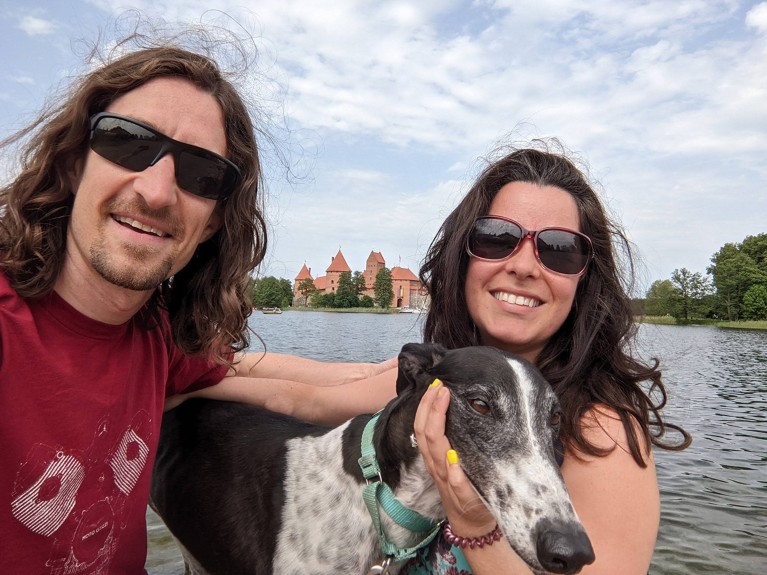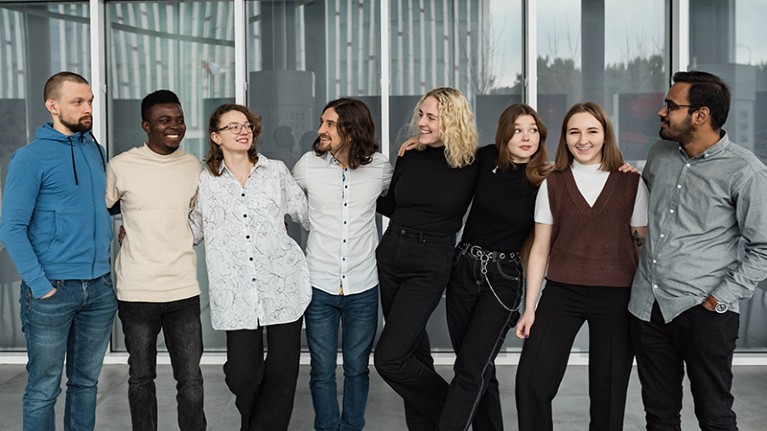
Stephen Knox Jones moved to Vilnius with his wife, Eva Sadler, and his dog, Audrey Sparkles. Credit: Eva Sadler
I first became aware of Lithuanian science in 2015 when I was a postdoc at the University of Texas at Austin. I’d transitioned from research in cellular ageing to gene editing, beginning with CRISPR. Lithuania is one of the places where gene-editing tools have really developed over the past few decades.
Six years later, I started applying for faculty positions. I got two offers from institutes in the United States and one from an institute in Denmark, but the one I got from Vilnius really excited me. I was offered €1 million (US$1.3 million) to set up a lab based at Vilnius University’s Life Sciences Center, which had newly partnered with the European Molecular Biology Laboratory (EMBL), focusing specifically on developing gene-editing technologies.
It was attractive for two reasons. It was an area of excellence in my field; and it was a new institute. One thing I had seen throughout my training is that a lot of times you end up having vestiges of previous administrations that make it very difficult to implement best practices.
At Vilnius, I would be working with other new group leaders — six in total — so we would be able to shape the institute. It also meant that I wouldn’t be the one new person here; we were all taking our step to independence together. I arrived in July 2021 with my wife, Eva Sadler — a writer and editor — and our greyhound, Audrey Sparkles.
We received help with visas and permits; accommodation and transport; financial support for relocating; city tours of Vilnius, which has a beautiful Old Town; and even help with shopping when we arrived. As part of the EMBL partnership, I was given assistance with purchasing equipment and consumables, bringing students and employees on to my team, and navigating the research ecosystem I was now part of.
Soon after I arrived, I started an international association to help support other people coming from abroad, providing mentors and acting as a liaison to help with administration. The association also coordinates social events and language classes. I’m learning Lithuanian and I advocated for having language classes at the Life Sciences Center. There are now two a week.
Once I arrived, I thought, ‘Okay, I’ve got one more year that I’m eligible for this European Research Council (ERC) Starting Grant.’ I got it on the first try, which is good, because that’s the only try I had. I was awarded €1.2 million. It was the first ERC starting grant ever awarded in Lithuania.
Getting this grant means I can tell my team members to focus on the science — in our case understanding how well the current gene-editing tool sets work, and how we can apply them safely and make them better. I won a second grant in January, an Installation Grant from the European life-sciences organization EMBO. It is the only one awarded this year in Lithuania. With the grant, I am looking for another postdoc student.
A growing lab
Currently, I have six graduate students and postdocs, and six undergraduate students. It’s an international team. Until February, we had a master’s student from Lagos on the team. My group also includes a remote summer intern at the University of California, San Diego, and a PhD student from Pakistan. There are also Lithuanian-born scientists who have studied elsewhere and come back, as well as others who have never left the country.

Stephen Knox Jones (centre) with his team at Vilnius University’s Life Sciences Center.Credit: Jurgita Satkūnaitė
The undergraduates spend 10–15 hours a week in the lab as part of their theses, doing primary research. It’s one of the things I love about Lithuania: students here start their research careers much earlier than they do in the United States.
If research is not for you, you should learn that as soon as possible, so that you can find the right career path. Here, students get involved in the research, they understand what it takes, the ups and the downs and the strategies in general.
One of the other things that attracted me to Lithuania is its history, and the infrastructure that has been implemented since its independence from the Soviet Union in 1990. It’s a lot more agile than elsewhere in Europe and the United States — it is not weighed down by old systems. For example, the idea for the Life Science Center, in which I now work, came about in 2010, and it now offers a world class facility for around 1,000 students, including more than 110 PhD students, alongside some 200 researchers. The biotech companies that have started up close by in Vilnius, and that offer students research work, provide a unique opportunity.
I returned to the United States for two weeks last year and I was happy to see my family and friends, and their new babies. But I’m not certain I’ll go back permanently. We’ve bought a flat here. In my spare time, I’m recording a soul pop album with Eva. (I used to be in a band called the Bone Pilots in Texas and I still love writing music and performing.) I also enjoy motorcycling, and I do acroyoga with friends.
I like the fact that Lithuania prioritizes well-being — in general, people are thoughtful about others. The country’s lakes and forests offer wonderful access to the natural world. I talk to my researcher friends elsewhere, and the quality of life I have, compared with theirs, it could be night and day. It’s a great experience.

 How to fit in when you join a lab abroad
How to fit in when you join a lab abroad





